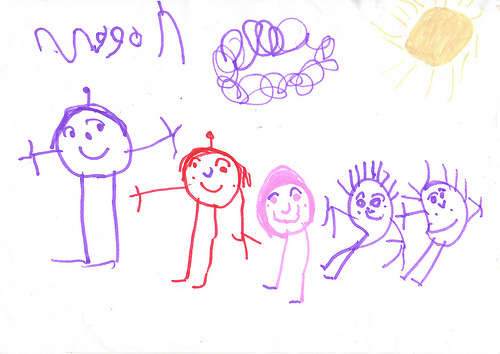The Name of Jesus, January 1, 2011
Lectionary Reflection
But when the fullness of time had come, God sent his Son, born of a woman, born under the law, in order to redeem those who were under the law, so that we might receive adoption as children. —Galatians 4:4-5
Families come in all shapes and sizes, yet all too often we humans try to ascribe a cookie-cutter pattern to the notion of what a family should look like or how its members should behave. For “boomers” television families like the Cleavers of Leave it to Beaver and the Douglas family of My Three Sons defined the ideal or “normal” family. Lately, network and cable families have come to look considerably different; compare the Cleavers to the extended Pritchett clan of Modern Family, for example, or contrast the Bunkers of All in the Family fame to the Chance family of Raising Hope.
 What constitutes family? My spouse and I have had occasion to consider this question as we’ve blended our two families this year, trying to honor each other’s culture, patterns, and expectations of what it means to be a new and distinct family unit. Defining family becomes complicated when we layer societal expectations and assumptions over varying realities and arrangements. Some definitions are narrow while others are broad and inclusive.
What constitutes family? My spouse and I have had occasion to consider this question as we’ve blended our two families this year, trying to honor each other’s culture, patterns, and expectations of what it means to be a new and distinct family unit. Defining family becomes complicated when we layer societal expectations and assumptions over varying realities and arrangements. Some definitions are narrow while others are broad and inclusive.
According to dictionary.com the word itself comes from the Middle English familie, which has its roots in the Latin familia, meaning “a household, the slaves of a household, equivalent to famul (us) servant, slave + -ia —y.” If you want to see how broadly the word is finding use, check out the Wikipedia entry for “family.” Anyone can edit wiki content, so the concept of family is expressed quite extensively and broadly. This much is true: family matters and family matters can become quite complicated–especially in our faith communities.
 This Sunday we have the option to celebrate The Name of Jesus, and we also begin a brand new calendar year. This dual reality provides an excellent opportunity to discuss the nature of our faith family and our full adoption into the family of God. Names are important, and in our various and changing ideation of what constitutes family units, how we express names and understand them in relation to the physical expression of the family can be critical.
This Sunday we have the option to celebrate The Name of Jesus, and we also begin a brand new calendar year. This dual reality provides an excellent opportunity to discuss the nature of our faith family and our full adoption into the family of God. Names are important, and in our various and changing ideation of what constitutes family units, how we express names and understand them in relation to the physical expression of the family can be critical.
The gospel lesson for this day ends with the official naming of Jesus in conjunction with the ritual circumcision. This name was bestowed upon the human child and Word incarnate by the angel and is jam-packed with meaning and promise. In the epistle lesson from Galatians, Paul explains how we are incorporated as children of God through Jesus, fully adopted and incorporated into the family unit, not just slaves on the outskirts (See why it’s important to understand the etymology of the word family?).
 In baptism we become a Christian, or “little Christ.’ We are fully incorporated into the family of God in a particular context and community or family of faith. Just like biological families and blended families, our faith families experience varying levels of health and dysfunction. We may walk away from that particular community, a move may force us to find a new faith family, or we may completely opt out of the family, but the family mark has been bestowed upon us nonetheless. We are influenced by the family of God and we may also influence this family by our choices and actions. Again, family matters.
In baptism we become a Christian, or “little Christ.’ We are fully incorporated into the family of God in a particular context and community or family of faith. Just like biological families and blended families, our faith families experience varying levels of health and dysfunction. We may walk away from that particular community, a move may force us to find a new faith family, or we may completely opt out of the family, but the family mark has been bestowed upon us nonetheless. We are influenced by the family of God and we may also influence this family by our choices and actions. Again, family matters.
On this Sunday, why not consider the “family unit” of which we are a part–the congregation, the regional and national church body, and the church catholic through time and space? What family matters might need to be addressed in this new year? What resolutions should the church family/community make? How can we ensure that our faith family/community truly matters to those within its gathering? Who needs to be invited or more fully included?
 Family matters and names do have real and important meaning. Perhaps this year is a good time to explore these things, and like Mary, ponder in our collective hearts exactly what it means to be God’s people, the Creator’s adopted family, in this particular place and context. Blessings on your preaching, teaching, and work together this day and throughout 2012.
Family matters and names do have real and important meaning. Perhaps this year is a good time to explore these things, and like Mary, ponder in our collective hearts exactly what it means to be God’s people, the Creator’s adopted family, in this particular place and context. Blessings on your preaching, teaching, and work together this day and throughout 2012.
Visual
Consider projecting a montage of clips from various television “family” shows past and present. Which ones might reflect your context and might “jar” your community? It might be a mash-up of The Waltons, The Beverly Hillbillies, Dallas, The Brady Bunch, and 7th Heaven (the Camdens), or you might combine any number of other family shows. The point of this visual is to encourage folks to think about family, how the media helps or hinders us in exploring what family means, how it can be constructed and understood, and how our church is family unit as adopted children of God.
With Youth
Ask youth to define the word “family” by writing it down. Assure them that there are no right or wrong answers, that you are seeking their understanding of the word. Once they have written down their answers, read the definition from Wikipedia. Discuss how their answers are similar or different. Finally, ask what it means to be part of God’s family. How do they understand this concept? What responsibilities, rights, and obligations come with being part of various family units?
With Children
To be named and claimed is a joyous thing. Talk with children about how their names were chosen. Remind them that when their family brought them to be baptized, they also received the name “Child of God” and became a part of God’s family that gathers at (name of congregation).
Another possibility is to invite a family that has chosen to adopt a child or children to talk about what adoption has meant to them and their creation of family. Expand on the concept of how we are all adopted children of God through Christ Jesus.
(Photo by Children’s Book Review, born1945, ronnie44052, greeneconnections, and ineffable_pulchritude used under Creative Commons License. Thanks!)




Leave a Reply